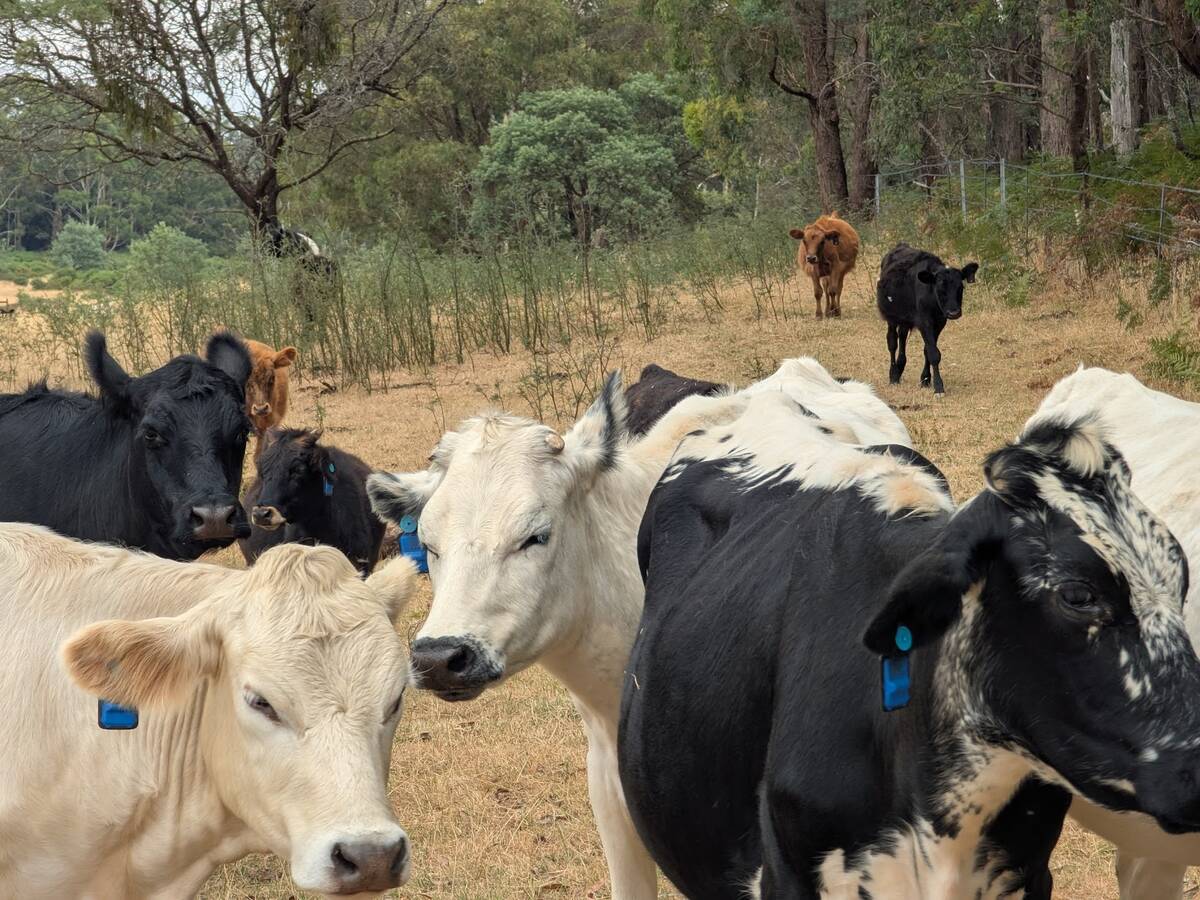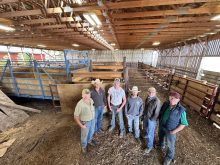For several years since becoming a farmwife myself, I have sat at the kitchen tables with farm women, interviewing them for my first two published books — and having candid, off-the-record conversations. My Farmwives book project was a two-book series highlighting mostly long, happy marriages and advice for women marrying farmers today.
I’d be lying, though, if I didn’t admit that I often found myself curious about the complications of “shared yards,” women living in homes they don’t own and sometimes working long hours without financial compensation. While diversity in gender, roles and families is increasingly acknowledged these days, marriage and divorce are as complex as ever for farming couples.
In this first part of a two-part series, I wanted to learn what considerations people should be aware of when marrying “into” a farm or ranch family. Later, in part two, I will share what I’ve learned when asking questions from the farmers’ perspectives before marriage.
Read Also

Australian company brings ear-tag tech to Canadian pastures
With Smart Paddock, beef farmers and ranchers can track their cattle through GPS technology
Divorce trends
In my research, I learned there were 42,933 divorces granted in Canada in 2020. This was a sharp decline from the 56,937 recorded in 2019. While this decline was most likely triggered by the pandemic, divorces have been declining for many years now.
The length of marriage is changing too. In 1980, the average length of marriage for divorced people was about 23 years; by 2020 that had risen to 30 years.
Despite facts, figures and statistics that illustrate data, what remains true is that divorce rates affect people and families, and Canadian farms and ranches are not immune.
What can be specific to farm families experiencing divorce, however, is that it can involve messy home and asset ownership (sometimes inter-generational). The operation and ownership of a large corporation, and the family home, may not be clear-cut.
Divorce trends are something I discussed with Elaine Froese, speaker, author and certified coach who has been dubbed Canada’s “Farm Family Whisperer.” She echoes that trends are changing.
There is now a tendency for people to divorce later in life and after more years of marriage. In March 2022, Statistics Canada reported that although divorce rates generally had declined over the past 50 years, the average age of people divorcing is now around 46 compared to 36 in 1980.
Froese says, “Pay attention to how tired the women are.” She often hears that women can be resentful for giving the best years of their life to the farm and ranch. She adds that people often don’t feel seen or heard.
There are other factors involved, too. Almost one-third of divorces are now the result of a joint application of both spouses.
Farm-specific complications
As we all know, in farming or ranching, it’s common for couples to live in homes they do not have the title to or to live on land they do not own as a married couple.
There is often an assumption that the assets of a couple are divisible by half when it comes to a divorce. However, the reality can be complicated when it comes to farm companies and muddy living situations.

I have spoken with two lawyers about these scenarios. Please note that laws of property division are provincially regulated, and therefore it is impossible to provide legal information that would apply throughout Canada. While the lawyers I spoke to for this story offered insight into how to protect yourself if you’re marrying into a farming family, they also made it abundantly clear that they are not providing legal advice to any readers and that they should speak to a lawyer. So, the first clear message here is that anyone facing this situation should seek individual legal advice about their specific circumstances.
Catherine McCorquodale, a lawyer with Monteith Ritsma Phillips Professional Corporation in Stratford, Ont., says the following:
“Married spouses have equal possessory rights to the matrimonial home. This means regardless of how title is held to the matrimonial home, in the event of a separation, both spouses are entitled to reside in the matrimonial home. With some exceptions, such as criminal charges, neither spouse can kick the other one out of the matrimonial home. There are not the same possessory rights to the house if you are not married.
“Living in a corporately or family-owned property is a tricky situation in the event of separation. Generally, these situations are not covered under the Landlord Tenant Act, which provides for rules and procedures to permit a landlord to ask a tenant to leave. How you protect yourself is situationally dependent and an important factor to consider when you move into the property. You should consult with a lawyer to determine the best way to protect yourself in your specific situation,” says McCorquodale.
When I interviewed Stephanie Dobson, a registered collaborative lawyer with Henka Divorce in Lloydminster, Alta., for my book Farmwives 2: An Inspiring Look at the Lives of the New Canadian Farmwives, she offered the following information:
“Unless there is an agreement between you/your spouse and the owners, you may be seen by law simply as renters in the house/on the land, and it is possible that no ownership rights apply; in that case, your residence would not necessarily be a divisible asset. In order to counteract this, it’s advisable to enter into a written agreement with the land/homeowners to set out the intentions, if any, of an ownership transfer. Otherwise, be cautious about spending money on renovations or otherwise investing in the property.
“Upon marriage breakdown, spouses are entitled to divide the assets and debts owned by either or both of them. That means that even if your name is not on the assets, you will still be entitled to a 50 percent share in the total net worth between you and your spouse. This extends to all farm assets such as land, equipment, inventory, livestock, buildings, etc. In some provinces, this right extends to non-married cohabitating spouses,” Dobson adds.
One major consideration, though, is that many provinces have exemptions, Dobson says. “Two main areas affecting farm families are exemptions relating to 1) inheritances/gifts and 2) assets brought into the marriage.
“Usually, the value of assets that existed at the date of marriage is not considered ‘shareable’ on divorce, but any increase in value may be shareable, depending on your province.”
For example, if land owned by your spouse at the date of marriage was worth $300,000 and by the end of your marriage is worth $500,000, then the shareable portion of the asset is only $200,000 (the increase), Dobson explains.
“At 50 percent, you would be entitled to $100,000. If your provincial laws recognize exemptions, this principle would extend to any inheritances/gifts/items brought into the marriage, both farm-related and otherwise.”
Clarifying expectations
Expectations around working on and/or off the farm can often become a source of discord.
“It’s a polarity that causes huge stress and tension when there is confusion about roles or unrealistic workload expectations. Women tend to add more to their list without subtracting or practicing good self-care. Does the farm serve the family — which is healthy — or does the family serve the farm?” Froese asks. She adds it’s important not to shove people into roles they’re not wired for.
Many couples are entering into domestic contracts, which outline things such as compensation, trust claims, pension, investments, or spousal support releases. These contracts can help lawyers complete equalization calculations in the case of separation or divorce.
Many law firms have blog posts or articles freely available. Agricultural organizations and advisory networks also put together conferences, articles and other resources. These offerings are an excellent starting point, but as McCorquodale says, “they are not a replacement for speaking with a lawyer, specifically a lawyer who completes domestic contracts as part of his or her practice.
“Many people question the cost of a domestic contract, but the cost of a court battle is significantly higher.”
The dance
Froese says that you are never done building and protecting your marriage.
Farming couples face a constant challenge — a pull between time for family and marriage versus the needs of the ranch or farm. She calls it the “polarity” in coaching. It’s a problem that never goes away but must be managed. It’s a constant dance.
In her coaching practice, Froese points people to onlyyouforever.com, which offers Zoom counselling.
If you decide to leave, she says it’s important to be transparent with your accountant and find a fee-for-service planner who has worked with divorcing farm clients.
Another tip — solidify your emotional support group. Divorce crystallizes who your true friends are in small towns. Local or regional self-help groups can support you without judgment.
Also, practice extreme self-care. If you are on the road to divorce, it is not easy. Find a mental health worker.
In part two of this series, I will share what I’ve learned when asking questions from the perspective of the successor on a family farm or ranch.
Until then, keep dancing!
Billi J. Miller is a published author, photographer and speaker from east-central Alberta. She freelance writes from her home office where she can be reached through her website at billijmiller.com. For more on her Farmwives books, visit billijmiller.com/farmwivesbookproject.
















